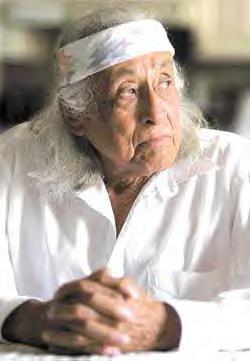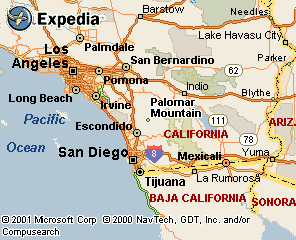|
|
Canku Ota |
|
|
(Many Paths) |
||
|
An Online Newsletter Celebrating Native America |
||
|
June 16, 2001 - Issue 38 |
||
|
|
||
|
La Jolla Tribal Elder to Receive Honorary Degree |
||
|
by EDWARD SIFUENTES staff writer North County Times |
||
|
Don Boomer/Staff Photographer |
 LA JOLLA
INDIAN RESERVATION - While walking the 4-acre plot of family land at the foot of Palomar Mountain, Henry Rodriguez
mused over the honorary degree he will receive Sunday from Cal State San Marcos. LA JOLLA
INDIAN RESERVATION - While walking the 4-acre plot of family land at the foot of Palomar Mountain, Henry Rodriguez
mused over the honorary degree he will receive Sunday from Cal State San Marcos. The 82-year-old Rodriguez is being recognized for his lifelong work advocating for better education, water rights and the preservation of the American Indian culture. "When President (Alex) Gonzalez called me to tell me about it, I lost my composure, I was very excited," said Rodriguez, a tribal elder of the 650-member La Jolla Band of Mission Indians. "Uncle Henry," as he is affectionately known to friends, is one of the last of his people who can still speak the Luiseno language, spoken by the original inhabitants of the Pauma Valley and Palomar Mountain area. Luiseno is a Spanish word that means "people of the San Luis Rey village" ---- a reference to the Oceanside mission that natives, under forced labor, built at the close of the 18th century. The Luisenos once inhabited 1,500 square miles of coastal Southern California, from Agua Hedionda Creek in the south to Aliso Creek in the north, and from Santiago Peak in the northwest to east of Palomar Mountain in the southeast. Today, they live on about 35,000 acres divided into five reservations: La Jolla, Pauma, Pala and Rincon in North County and Pechanga in Southwest Riverside County. But only about 18 people can speak the language anymore, Rodriguez said. Now retired, he smiles, saying he is more busy than ever. He is sought after by academics such as Bonnie Biggs, a professor at CSUSM, who is working with the La Jolla band and other local tribes to preserve and expand tribal libraries. "He is such a great man and so full of knowledge," Biggs said. During the course of his life, Rodriguez has been a tribal leader, a teacher, a mentor and a scholar to his people. "He has truly earned the title 'tribal elder,' " Gonzalez said. "The university is truly honored." As a young man, "Uncle Henry" joined the U.S. Army Air Force during World War II and later became an adobe home builder. But he said he turned to politics when he saw the "injustices" of federal, state and local governments upon his people. He served on the La Jolla band's tribal council and later became tribal chairman and was instrumental in establishing the Southern California Intertribal Council, now the California Tribal Chairmen's Association, which represents more than 20 San Diego and Riverside county tribes. Along with other tribal leaders, he fought for water rights of the San Luis Rey River. In 1988, local Luisenos won a long-standing battle with the federal government to retain rights to water that flows through North County reservations but is tapped by Vista and Escondido governments. In the end, federal legislation awarded local Luisenos $30 million for economic development on the La Jolla, Rincon, San Pasqual, Pauma and Pala reservations and rights to 16,000 acre-feet of water each year. "I guess I'm an activist, and I'm damn good at it," Rodriguez said, half smiling. Outside his home, the old man, whose brown, weathered face resembles that of a hawk, looks up at the mountain he calls his playground and where he "talks" with the animals. He recalls a childhood vanished but fresh in his memory. He said the old people in his tribe were kind to him in sharing their knowledge with him. "They only taught their stories and their songs to special people," he said. He also is not hesitant to talk about the "injustices" to his people, first by the Spanish, who helped destroy traditional culture and religion, and then the U.S. government, which removed tribes from their homeland and put them on reservations. Now, he says, the future of his people lies in learning to get along with others, education, and being open to new ideas. "You have to learn the system, learn it well, and then use it to your advantage," he said. "You have to work and get an education. You can't become a welfare state, and I'm not just talking about the reservations, but the surrounding community," Rodriguez said. For nearly 40 years, he has recorded those songs and stories for future generations on reel-to-reel tapes that Grossmont College is preserving. Today, the widowed father of five and grandfather of "too many to count" is a symbol of pride for local tribes which often invite him to bless and speak at special events. He also has been instrumental in organizing CSUSM's annual Pow Wow. Rodriguez is the third recipient of the honorary doctorate from CSUSM. Last year's recipient was local philanthropist Bob Mangrum. In 1999, Janet Kellogg was the recipient. |
|
Locate Palomar Mountain on the map! |
|
|
|
|
||
|
|
||
| Canku Ota is a free Newsletter celebrating Native America, its traditions and accomplishments . We do not provide subscriber or visitor names to anyone. Some articles presented in Canku Ota may contain copyright material. We have received appropriate permissions for republishing any articles. Material appearing here is distributed without profit or monetary gain to those who have expressed an interest. This is in accordance with Title 17 U.S.C. section 107. | ||
|
Canku Ota is a copyright © 2000, 2001 of Vicki Lockard and Paul Barry. |
||
|
|
|
|
|
The "Canku Ota - A Newsletter Celebrating Native America" web site and its design is the |
||
|
Copyright © 1999, 2000, 2001 of Paul C. Barry. |
||
|
All Rights Reserved. |

